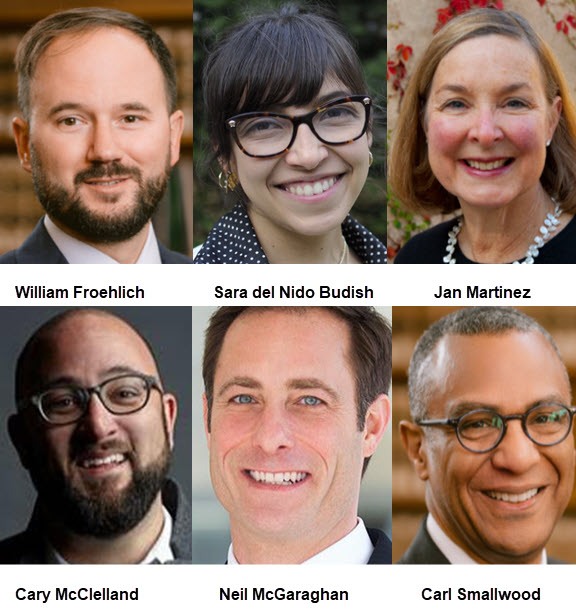Abstract
Excerpted From: William Froehlich, Sara del Nido Budish, Jan Martinez, Cary McClelland, Neil McGaraghan and Carl Smallwood, An Introduction to the Collaborative Symposium Series “Rethinking Systems Design for Racial Justice & Equity”, 38 Ohio State Journal on Dispute Resolution 1 (2023) (33 Footnotes) (Full Document)
 In late 2020, the Divided Community Project (DCP), housed at The Ohio State University Michael E. Moritz College of Law's Program on Dispute Resolution, envisioned hosting a collaborative event series designed to draw together and elevate dispute systems design lessons for enhancing racial equity from US-based truth, reconciliation, action, and equity commissions. At that time, the list included local processes initiated by district attorneys (Boston, Philadelphia, and San Francisco); by citizen led groups (Truth and Action project housed at Mitchell-Hamline School of Law); by city-councils (truth and reconciliation commission in Iowa City); and commitments from a nationwide group of mayors to advance reparations in more than a dozen communities across the country. In the subsequent two years, equity-focused commissions have proliferated. Most prominent have been the NYC Racial Justice Commission, established and active during 2021 to develop ballot proposals through a racial equity lens to revise New York City's charter, and the Charleston (S.C.) Special Commission on Equity, Inclusion, and Racial Conciliation. Statewide commissions include California (2-year reparations task force) and Vermont (5-year statewide Truth and Reconciliation Commission (TRC)).
In late 2020, the Divided Community Project (DCP), housed at The Ohio State University Michael E. Moritz College of Law's Program on Dispute Resolution, envisioned hosting a collaborative event series designed to draw together and elevate dispute systems design lessons for enhancing racial equity from US-based truth, reconciliation, action, and equity commissions. At that time, the list included local processes initiated by district attorneys (Boston, Philadelphia, and San Francisco); by citizen led groups (Truth and Action project housed at Mitchell-Hamline School of Law); by city-councils (truth and reconciliation commission in Iowa City); and commitments from a nationwide group of mayors to advance reparations in more than a dozen communities across the country. In the subsequent two years, equity-focused commissions have proliferated. Most prominent have been the NYC Racial Justice Commission, established and active during 2021 to develop ballot proposals through a racial equity lens to revise New York City's charter, and the Charleston (S.C.) Special Commission on Equity, Inclusion, and Racial Conciliation. Statewide commissions include California (2-year reparations task force) and Vermont (5-year statewide Truth and Reconciliation Commission (TRC)).
The DCP was grateful for The Ohio State Journal on Dispute Resolution's willingness to collaborate, edit, and develop a multi-issue journal publication connected to this theme. DCP invited colleagues from Harvard Negotiation and Mediation Clinical Program (HNMCP), and Stanford Law School's Martin Daniel Gould Center for Conflict Resolution (SLS) to join in an event series of symposia featuring communities engaged in the design, development, and implementation of truth and reconciliation-style commissions.
SLS and HNMCP added valuable insight to DCP's vision to create two tracks: (1) connecting and supporting emerging commissions; and (2) curating academic symposium events and accompanying articles related to the design of race equity processes. This introduction highlights how the symposium series and connected articles were developed and how collaborators have supported, and continue to support, processes for advancing racial justice and equity.
[. . .]
Dukes and Cozart remind us that “systemic change takes time” and suggest “[m]aking change involves a call for enduring commitment rather than for patience. If the moral arc of the universe bends at all, it by no means necessarily bends towards justice; rather, it bends the way that people make it bend.”
We hope this symposium series might inspire you to embed one idea in your community, focus on equity, justice, and race in the classroom, or energize your commitment to systemic change. Collectively, we anticipate continuing this collaboration, facilitating conversations, learning and sharing scholarship related to dispute resolution and systems design, and aspiring to the call for an enduring commitment to “bending the arc” toward a more just and equitable society.
_______________
William (“Bill”) Froehlich is Langdon Fellow in Dispute Resolution and Deputy Director of the Divided Community Project at The Ohio State University Moritz College of Law.
Sara del Nido Budish is Assistant Director of the Harvard Negotiation and Mediation Clinical Program (HNMCP), and a Lecturer on Law at Harvard Law School.
Janet Martinez is the Director of Stanford Law School's Martin Daniel Gould Center for Conflict Resolution.
Cary McClelland is a civil rights lawyer, award-winning writer and filmmaker, and Lecturer in Law at Stanford Law School.
Neil McGaraghan is a Clinical Instructor in the Harvard Negotiation and Mediation Clinical Program.
Carl Smallwood is the Director of the Divided Community Project and a retired partner at Vorys, Sater, Seymour and Pease LLP in Columbus, following a successful career resolving disputes by litigation and negotiation.


